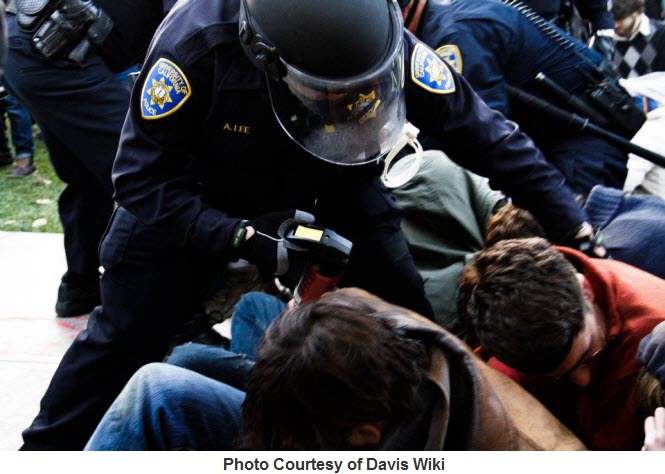
One of the big mysteries in the pepper spray incident was the identity of the second pepper sprayer. Both the police officer’s union, through the court system, and the university kept the second officer’s identity a secret, due in part to security concerns and the fear that the harassment suffered by Lt. John Pike would be visited upon the second officer.
The Vanguard published the name, Officer Alexander Lee back on March 27 after getting ahold of a photo from November 27 that depicted Officer A. Lee.
The Enterprise apparently had these photos, as well, as they reported: “Still photographs show the second officer’s name badge as reading ‘A. Lee.’ The Enterprise has been attempting to obtain the officer’s first name for months, without success.”
Records obtained from the university through the public records act shows the paper went to great lengths to get the university to directly release the name of the officer. And while the Vanguard applauds the Enterprise for their effort, sometimes the best way to get information is to go the less direct approach and get it through the side door.
What the Vanguard did was make a number of small records requests using known information, and filling in the full puzzle.
The Vanguard started with two critical pieces of information. First, we had the photo depicting a UC Davis police officer, A. Lee, pepper spraying students on November 18 – a photo first posted on November 29 on the Davis Wiki.
The Davis Wiki had also found the name Alexander P. Lee but his name was found in the campus directory as a security guard – a non-commissioned position, whereas the Officer A. Lee was depicted in the pictures as a UC Davis officer. The individual that discovered this let the Vanguard know that soon thereafter, the name disappeared from the campus directory, perhaps further confirming this is the right person.
From those two pieces of information, the Vanguard was able to tentatively, at least, confirm that he was an officer with the UC Davis Police Department when one of our assistants called the department and asked for him by name – seemingly confirming his employment. The fact that they would not let the caller leave a message for him instead seemed to confirm that he was off limits and therefore likely suspended.
This was enough for us to publish the first article with reasonable certainty. But not enough for the Davis Enterprise.
Reporter Cory Golden, in a comment, said, “The name of the blog is not referenced here because we’ve been unable to independently confirm A. Lee’s first name. It would be irresponsible for us to publish a first name that we do not know to be correct – or to point our readers to a blog that references a name we don’t know to be accurate.” He added, “It’s not meant to be disrespectful, at all. If it turns out to be accurate information, I’ll name the blog.”
Through a public records request with the university, the Vanguard obtained the duty roster for the week of November 14-18. That roster only contained first initials, but does let us know there is only one Officer Lee working for UC Davis.
The Enterprise, as we mentioned, went to considerable lengths to determine Officer Lee’s identity.
As a December 23, 2011 email from Chief Counsel Steven Drown to Debbie Davis, Editor of the Davis Enterprise, indicates, there was a meeting between staff of the Enterprise, along with CalAware’s Terry Franke and UC Davis officials to “discuss Cory’s request for the name of the second UC Davis Police Department officer who used pepper spray during the November 18, 2011, campus conflict.”
Mr. Drown argued that, under the circumstances of this case, the officer’s name is exempt from disclosure under the California Public Records Act.
Mr. Drown would argue that “the disclosure of the officer’s name, given other publicly available information, would indicate that the officer is the subject of a University internal affairs investigation concerning the November 18 incident.” He adds, “It was my view that this information is a confidential personnel record under Penal Code section 832.7 and 832.8, which cannot be disclosed to the public unless a ‘Pitchess Motion’ has been granted by a reviewing court.”
So here you have a case where the UC Davis Chief Campus Counsel argues that this is protected under Penal Code Sections 832.7 and 832.8 and a few months later, at least initially, UC’s General Counsel Charles Robinson is arguing the opposite.
Mr. Drown added, “As you know, the name of one of the officers, Lieutenant John Pike, became widely known due to his identification by onlookers and widely broadcast electronic media. The name of the second officer is not widely known.”
“To disclose the name of the second officer now would disclose the fact that the officer is subject to an internal affairs investigation, which is confidential personnel information exempt from disclosure under the authorities described above.”
Mr. Drown then went on to cite Copley Press v. Superior Court of San Diego County, where the “California Supreme Court found that the name of a peace officer who was subject to disciplinary action was protected from disclosure.”
The Vanguard, in the meantime, had made a simple request – a list of the full roster from June 2011 – with full first and last names.
Why would we ask for this? Primarily because it would give us a sense of whether Alexander Lee was a police officer with the department five months before the event. We know that names and positions are public records that we can obtain on employees. Five months prior to the event made it difficult for the university to exempt any record.
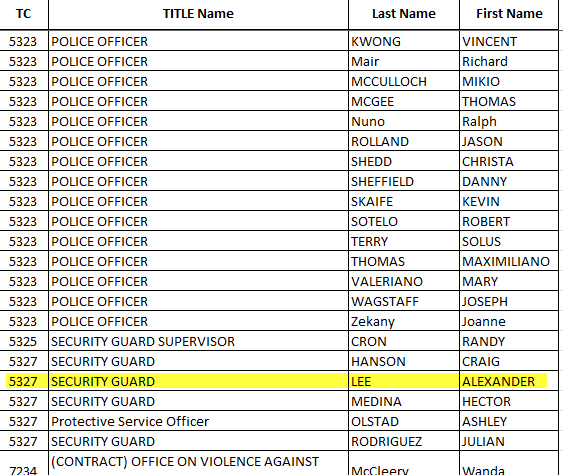
What we learn from this are two key pieces of information. First, that there was an Alexander Lee who worked for the department as a security guard in June 2011. There are no other employees with the last name of “Lee” at that time.
That led us to a critical question: is it possible that a security guard, basically a non-sworn employee, could become a full officer? We asked a former police chief at UC Davis if this was even possible and were told that, while it was not a typical means of hiring, it was not impossible or unprecedented.
But, of course, this was not enough to prove that Security Guard Alexander Lee was Officer A. Lee.
So we made one further inquiry – we asked for a list of officers, their date of hire, position titles, date of promotion.
We did not get everything we asked for. We were informed by Elizabeth Wisnia, Information Practices Analyst at the Office of the Campus Counsel, that “information regarding promotions and advancement of peace officer is protected from disclosure pursuant to Section 6254(k) of the Public Records Act (‘PRA’) (California Government Code Section 6250-6270) which does not require public release of ‘[r]ecords, the disclosure of which is exempted or prohibited pursuant to federal or state law, including, but not limited to, provisions of the Evidence Code relating to privilege.’ Section 6254(k) encompasses Penal Code 832.7 which exempts police officer personnel records from disclosure and 832.8 which defines peace officer personnel records. PC832.8(d) includes ‘Employee advancement, appraisal or discipline’ in the definition of peace officer personnel records.”
Despite this, which would have shown exactly when Alexander Lee was promoted to police officer, we were able to learn that Alexander Lee is a police officer and he was originally hired on September 1, 2010.
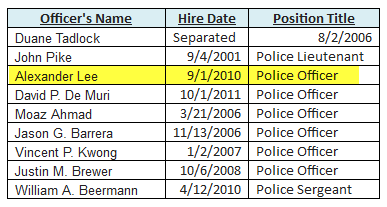
What is interesting is that the university was going to give us the information we needed one way or another at this point. Because we asked for public records for more than just Officer Lee, the university had to comply with those requests. If they would have redacted the record of just Alexander Lee, we would have known for sure he was the one. If they would have tried to redact all records, that too would have tipped us off. And the release of the record becomes the final confirmation because now we know that Alexander Lee is in fact a police officer and not just a security guard.
To recap. We know that A. Lee was on the active duty roster for the week of November 14-18. We know from his picture he was a police officer. We confirmed it was Alexander Lee with the June 2011 duty roster which showed that Alexander Lee was a security guard. We also know that there was only one Officer Lee working at UCDPD at the time. And we know that Officer Lee is now a police officer. Put it all together and we have clear and convincing evidence that A. Lee is Officer Lee.

The date of hire also explains the payroll records. These records only go up to 2010. But they show Alexander P. Lee was first hired as a security guard in 2010. Prior to that, he appears to have been a Cal Aggie Host from 2006 to 2008.
What this tells us is that Officer Alexander Lee was basically a rookie officer in November 2011 having recently been promoted to officer from security guard sometime between June 2011 and November 2011. We don’t have the specific date because the university withheld that record, however we know it was so recent that even on November 29, the change was not reflected in the university’s payroll system.
We also know from the report that Officer O is Officer Alexander Lee. According to the task force report, Officer Alexander Lee “acting at Lieutenant Pike’s direction” pepper sprayed a “smaller portion” of the protesters who were in a seated line.
The Kroll report writes, “The actual deployment of pepper spray by Lieutenant Pike and by [Alexander Lee] at Pike’s direction was flawed and unnecessary.”
The report continues, “Lieutenant Pike appeared to have exhausted the contents of the canister and [Officer Alexander Lee] began to spray some of the students seated on the west portion of the group.”
According to Alexander Lee, “Lt. Pike issued an order to me to use police pepper spray on the crowd. I sprayed the crowd directly in front of the police skirmish line using a department issued pepper spray fogger Defense Tech MK-9.”
That is pretty much the extent of Officer Lee’s role here. He was a rookie officer taking direction from Lt. Pike, a longtime veteran Lieutenant. Given the circumstances, it is reasonable to understand that the officer was hardly in a position to question the orders and therefore it is difficult to find much cause for his termination.
At the same time, we believe this represents a great object lesson in the pursuit of public records. Sometimes the best approach is to put together a puzzle through small and defensible public records requests, rather than attacking the issue head on.
—David M. Greenwald reporting


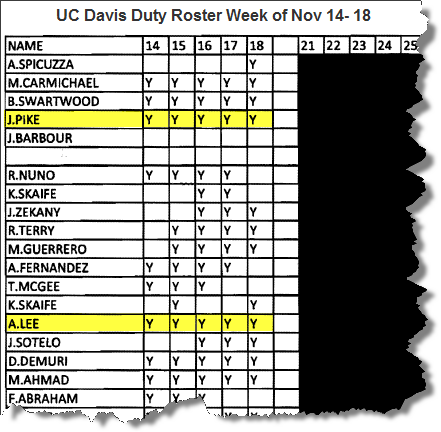



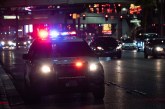
But the larger question is whether you should have published Officer Lee’s name. Just because you CAN does not mean you SHOULD…
Elaine: It’s not a question in my mind whether I should or shouldn’t. To me he committed a crime and in my opinion he badge get to shield him from actions that take place in the public under the scrutiny of video. We’ve named three of the redacted names and frankly we could have named it all. It’s absurd for them to have believed they could have anonymity for acts committed in public.
Sorry, you both make good points, but you’re both wrong. David’s use of public records requests is one of the best things he does with this enterprise.
I know of no one who really believes the officers’ names are protected by the law. Even though the parties came to an agreement to redact the names in order to get the report out without further delay, the agreement did not cover the media in any way.
Why should anyone [u]not[/u] print the names of the participants if they’re known? Why should anyone [u]not[/u] work to find out who was involved? The public has a right to know what happened. Just because the university and the union came to an agreement doesn’t mean any public good resulted from their deal.
On the other hand, if David thinks he should use the records act just to harass an authority figure whom he’s decided “has committed a crime,” he’s missed a major part of the potential value of the [i]Vanguard[/i]. And, his preconceived notion will get “supported” with cherry-picked information from the study.
One has to wonder what laws David thinks Officer Lee has broken and what proof anyone has offered. In any case, to my mind, none of this should have affected David’s decision to find and publish the names of the officers and those who were arrested or who otherwise were newsworthy.
It’s not a question in my mind whether I should or shouldn’t. To me he committed a crime and in my opinion his badge doesn’t shield him from actions that take place in the public under the scrutiny of video. We’ve named three of the redacted names and frankly we could have named it all. It’s absurd for them to have believed they could have anonymity for acts committed in public.
Obviously it is a question in your mind, otherwise you wouldn’t have printed them. Setting that aside, I notice you said “to me he committed a crime……” in other words, forget the legal system and its attempts to cover his name, I’m going to dispense my own brand of vigilante justice, by targeting him. By the way, the vanguard delivered an impassioned plea about the dangers of targeting people when referencing congresswoman giffords and that shooting. Now when it comes to the vanguards own personal vendettas, we hear a different tune.
‘I’m going to dispense my own brand of vigilante justice”
The words “vigilante justice” imply calling for some form of harm over and above what the actions of the individual have already self inflicted. I have no idea whether what A. Lee did was or was not criminal. However, I do know that it was done in full public view and was filmed.
What David has here is a nicely done bit of investigation. That is his job. He is a journalist. He has made it very clear that it is his opinion that Mr. Lee committed a crime. He is not claiming to be an internal reviewer, prosecutor,
lawyer, juror or judge. He discovered the facts and published them through entirely legal means. He made no call for any particular action against Mr. Lee. How one could interpret this as dispensing “my own brand of vigilante justice” is beyond me. This is especially true given another quote from the same article: ” Given the circumstances, it is reasonable to understand that the officer was hardly in a position to question the orders and therefore it is difficult to find much cause for his termination.” in which David expresses understanding for the difficult postion in
which Mr. Lee as a rookie found himself being under direct order from a superior.
[quote]Elaine: It’s not a question in my mind whether I should or shouldn’t. To me he committed a crime and in my opinion his badge doesn’t shield him from actions that take place in the public under the scrutiny of video. We’ve named three of the redacted names and frankly we could have named it all. It’s absurd for them to have believed they could have anonymity for acts committed in public.[/quote]
What “crime” did Officer Lee commit? I didn’t know you were a judge and jury. Are you the executioner too? What happened to the notion of due process and innocent until proven guilty?
Journalists all the time are called on to use their better judgment in publishing names, e.g. victims of crime. You knew there was the possibility this office would be harassed unmercifully by the public as Office Pike had been, but decided you didn’t care/decided for yourself the chance was minimal – for the sake of a “gotcha” moment to prove you are a superior investigative reporter to the Davis Enterprise. Perhaps the Davis Enterprise in its infinite wisdom/editorial judgment decided it was better not to print the name – in light of the ongoing litigation over printing officers’ individual names for fear of backlash from the public as happened to Officer Pike. It is and always has been a judgment call. IMO naming the officer did not add anything to the discussion of the Reynoso report, which recommended a change in policy, but did put the rookie Officer in harm’s way for really no good reason. We’ll have to agree to disagree on this one…
You don’t get to have a diatribe, accuse me of things, and then say we’ll have to agree to disagree on this.
What David has here is a nicely done bit of investigation. That is his job. He is a journalist. He has made it very clear that it is his opinion that Mr. Lee committed a crime. He is not claiming to be an internal reviewer, prosecutor,
lawyer, juror or judge. He discovered the facts and published them through entirely legal means.
Ohhhh, no! you don’t get to get away with that crap. He did not simply publish facts. He targeted a person. There is a difference. There is only one reason you would put a proverbial bullseye on an individual like that, in that manner. And he had the facts in front of him to go by – namely that officer Pike had been another “target” of threats.
You also have his own words to go by, he said it himself – that this is called “accountability”. He even called it “justice”. Yes, justice – the vanguard’s own brand- vigilante justice, that is.
“He did not simply publish facts.”
Actually I did. These are all facts. In fact, the comments you object to in terms of justice and accountability do not appear in this article. In fact, those terms are not used by me at all here. They are used by you. It’s absurd to believe that an event that takes place in public, where the officers are wearing visible name tags. could have any expectation of anonymity.
vanguard: “Actually I did. These are all facts. In fact, the comments you object to in terms of justice and accountability do not appear in this article. In fact, those terms are not used by me at all here. They are used by you.”
No, they were used by you, and I reprinted them to make my point. They appear in the last article you wrote, with a similar jutification for publishing the same name.
vanguard: “It’s absurd to believe that an event that takes place in public, where the officers are wearing visible name tags. could have any expectation of anonymity.”
there you go again, Mr. I just-published-facts. Mr. halo over his head. I’m not stupid. I’m well aware of how to put someone in danger, how to publish something, how to target someone, and we all know, you do too. So we can quit the masquerade antics. It is not, I repeat not the fact that his name appears somewhere in a column. It is HOW his name appears, which gives me chills, which is considerably different than HOW it appeared in the Enterprise. I’m not going to explain it further, because I know that you know exactly what I’m getting at. Got it?
91 Octane
So is it your position that the public does not have the right to know the identity of police officers who may be abusing their power or position ?
[quote]You don’t get to have a diatribe, accuse me of things, and then say we’ll have to agree to disagree on this.[/quote]
??? You printed a long article, I commented on it in a paragraph. We don’t agree on this particular issue. 😉
Sorry if I missed this in the article and the analysis.
But how was it known that the name tag “A.Lee” corresponds to an officer of UC Davis Police Department? How was it known that “A.Lee was not an officer from UC Berkeley or from other agency from mutual aid?
To know that, wouldn’t you need to get the on-duty roster of all mutual aid agencies to at least know that there weren’t two “A.Lee”?
Confirmed three officers were put on leave – Pike, Spicuzza, and Lee. No other officers were put on leave from what I was able to confirm.
How did you confirm which officer was put on leave? How did you know that the Incident Commander on the operation plan (Officer P in the Reynoso Report) was not one of the three put on leave?
I asked UCD Spokesperson Barry Shiller.
I understand that your journey to finding the second officer’s identity is different to the chain of reasons I list below, but I am trying to get the minimum logical chain to draw the conclusion, according to what I think you have said:
1) Barry Shiller disclosed precisely that UCDPD officers “Alexander Lee” were put on leave.
2) The footage showed that “A.Lee” was pepper-spraying.
At this point, reason suggests that A.Lee is the officer put on leave, and the most important piece of the evidence is that Barry named the officers that were put on leave. Is there a reference article where Barry disclosed the names, or did you speak to him in person? If so, may I know when that happened?
Reasons aside, the above was not a proof that UCDPD Alexander Lee was A.Lee. Because there is still a possibility that the “A.Lee” shown on the footage is from a different agency, and UCDPD Alexander Lee was put on leave for a different reason. The missing information is whether Barry said, UCDPD Alexander Lee was put on leave for using pepper-spray on the quad. In that case, we would conclude at a higher confidence that “A.Lee” is UCDPD Alexander Lee.
[quote]“You knew there was the possibility this office would be harassed unmercifully by the public as Office Pike had been, but decided you didn’t care/decided for yourself the chance was minimal….”[/quote]Why do you think David knew there was any such possibility? I don’t know how anyone can argue there was that possibility after the world has moved on.
There’s a uniqueness about the Pike situation, and that’s why “it went viral.” If there was the slightest reason for similar concern about Lee’s action, he would have been identified the same time that Pike was. And, now that David has “exposed” him (not quite to the 99.9 % certainty that Edgar Wai would like), what has been the unmerciful harassment level?
This is a simple story of how information that an institution (the police union) tries to keep secret can be found out using public records. If David had not exposed his own non-journalist rationale (“I did it because I think he’s guilty of a crime.”), then what legal or moral reason would there be to criticize him for tracking down the information and publishing it?
Start the sentence with. “Identifying Alexander Lee in a photograph of him spraying demonstrators is wrong because….”
[quote]Why do you think David knew there was any such possibility? I don’t know how anyone can argue there was that possibility after the world has moved on. [/quote]
Like Gifford’s shooter moved on? He was obsessed with her for some time before shooting her…
“Identifying Alexander Lee in a photograph of him spraying demonstrators is wrong because….Like Gifford’s shooter moved on? He was obsessed with her for some time before shooting her…”
Martin, Robert and John as well.
Continues at Sunday Commentary ([url]http://davisvanguard.org/index.php?option=com_content&view=article&id=5313:sunday-commentary-pike-and-swartwood-should-face-criminal-charges&catid=63:law-enforcement&Itemid=114&cpage=30#comments[/url])